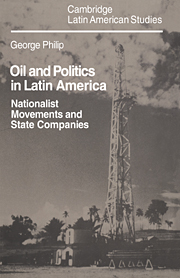Book contents
- Frontmatter
- Contents
- List of tables
- Preface
- Glossary
- Abbreviations
- Note on currencies and other units of measurement
- Maps: Latin America in 1920, 1940, 1960 and 1981; showing importing countries, exporting countries and countries self-sufficient in oil
- Introduction: The politics of oil in twentieth-century Latin America
- Part I The world oil environment
- Part II The major expropriations
- Part III The state oil companies
- Notes and bibliography
- Index
- CAMBRIDGE LATIN AMERICAN STUDIES
Introduction: The politics of oil in twentieth-century Latin America
Published online by Cambridge University Press: 23 December 2009
- Frontmatter
- Contents
- List of tables
- Preface
- Glossary
- Abbreviations
- Note on currencies and other units of measurement
- Maps: Latin America in 1920, 1940, 1960 and 1981; showing importing countries, exporting countries and countries self-sufficient in oil
- Introduction: The politics of oil in twentieth-century Latin America
- Part I The world oil environment
- Part II The major expropriations
- Part III The state oil companies
- Notes and bibliography
- Index
- CAMBRIDGE LATIN AMERICAN STUDIES
Summary
For many Latin Americans, oil is el excremento del diablo. More recently similar perceptions have come to be shared in far wealthier oilimporting countries. In the popular imagination, and not only there, the progressive and beneficial side of the oil industry – provision of lighting, heating, travel opportunities and the astonishing innovations in petrochemicals – has been tied in inextricably with a darker side which has featured massive corruption, the fomentation of political upheavals within particular countries and the concentration of power on an international scale in a way which has led to large-scale but unpredictable shifts in the structure of the world oil system.
Market economists have tried to explain the oil industry in terms of the familiar logic of cost and price, supply and demand, but have always found it necessary to bring the concept of oligopoly into their explanations. Oligopolies are rarely popular and some writers appear to have believed that by denouncing Standard Oil or opec, they could persuade them to go away. Others have tried to demonstrate that the oil market is inherently unstable unless controlled – for a time – by some form of cartel, even though cartels themselves may collapse in the long term. The fact of oligopoly, however, denotes at least some distance between the imperatives of the market and the decisions of the major producers.
- Type
- Chapter
- Information
- Oil and Politics in Latin AmericaNationalist Movements and State Companies, pp. 1 - 4Publisher: Cambridge University PressPrint publication year: 1982
- 1
- Cited by



